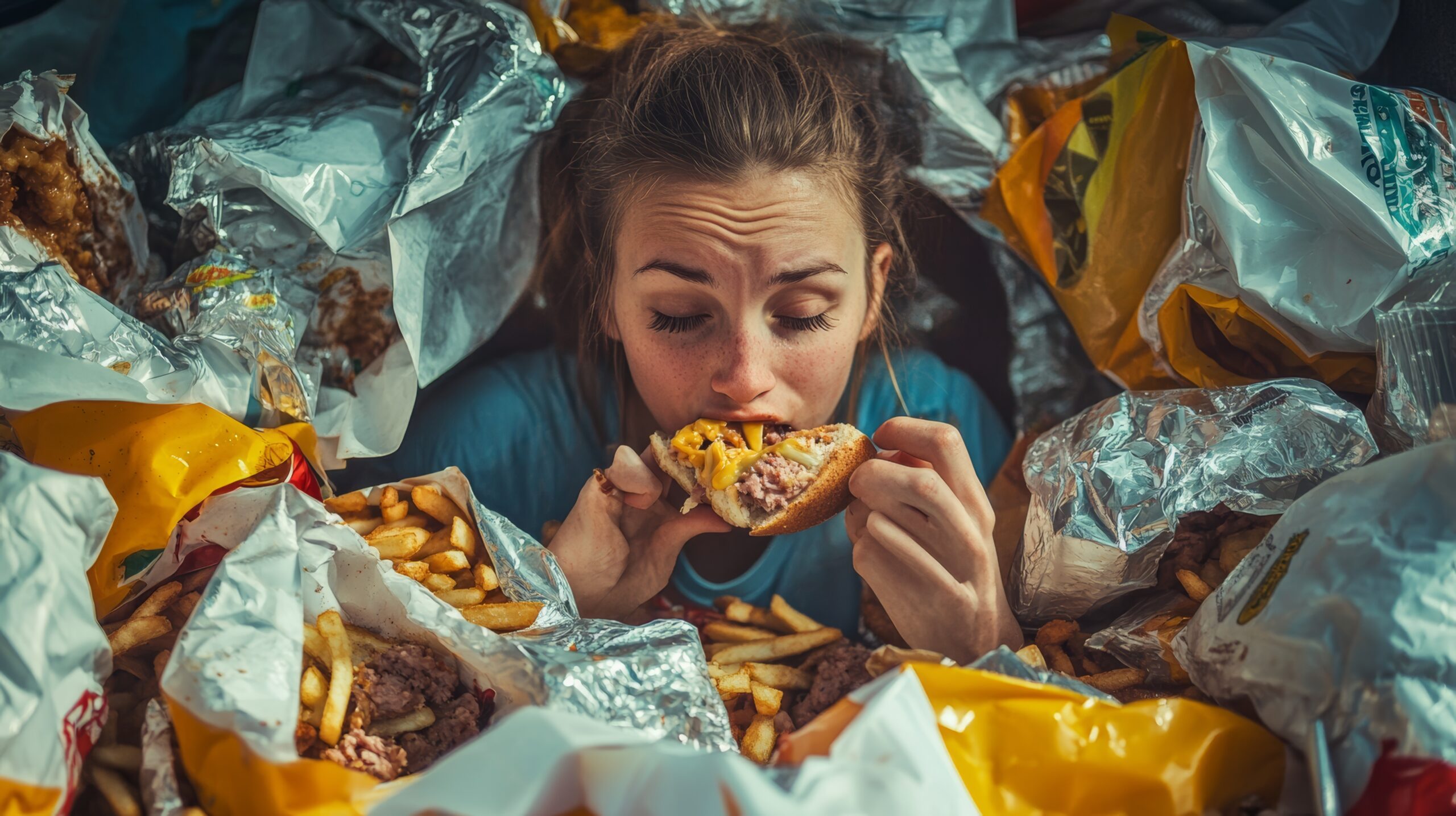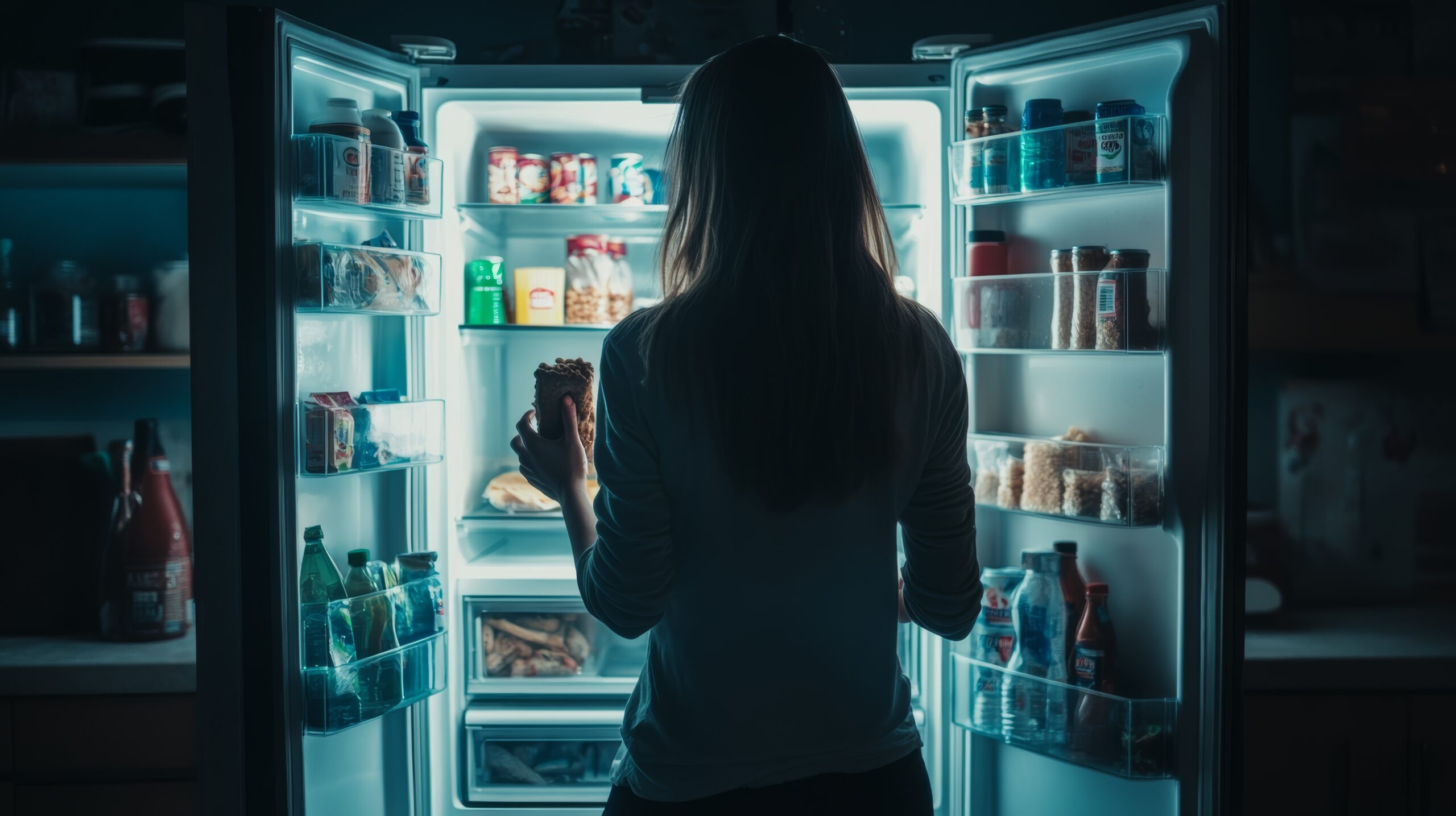How to stop eating junk food and UPFs
Learn how to overcome sugar and carb addiction, and stop craving unhealthy food with our expert tips. Take control of your diet and health today!

What’s stopping you?
Struggled with losing weight in the past? Unhappy about your relationship with food?
Start quizSo you want to know “Why do I keep binging on junk food and UPFs?”, “How do I stop eating junk food and lose weight?” and “how to stop craving unhealthy food”? That’s great but you first need to understand that the reason that you crave junk food, fast food, Ultra Processed Foods (UPFs), chocolate, candy, and other sweets is because of sugar and carb addiction.
Not all sugar and carbs are bad so it helps to know which are the ones that cause cravings.
The foods that contain addictive refined sugar are easy to identify – the addictive carbs are less so. Identifying them is important to enable you to lose weight.
7 tips on how to stop craving & eating junk food and lose weight
-
Don’t eat the obvious addictive sugar foods
Predictably these addictive sugar foods include chocolate, cakes, biscuits, cookies, candy, doughnuts, ice cream, syrups, and sweet pastries (anything with refined sugar in). These can be classed as ‘Bad Sugar’.
-
Avoid addictive carb foods
It is these addictive carb foods which are less obvious when it comes to sugar and carb addiction; foods such as pasta, pastry, bread, rice, noodles, potatoes, fries, and chips/crisps. These can be classed as ‘Bad Carbs’.
-
Stop eating addictive junk, UPF and fast food
Most processed foods and ultra process foods (UPFs) contain refined sugar and processed carbs and are therefore addictive. This includes all ‘fast foods’, ready-made-sauces, ready meals etc.
-
Change what you drink and avoid addictive sugar drinks
Any drink containing refined sugar but also, for some people, drinks containing concentrated levels of fruit (smoothies and juice) can also cause a problem with blood sugar levels (which is involved in ‘Bad Sugar’ and ‘Bad Carb’ addiction).
-
Understand sugar addiction and carb addiction
It’s the addictive nature of ‘Bad Sugar & Bad Carbs’ which make it difficult for some people to have “only a couple of cookies’ or “just two chocolates from the box” or “a small bowl of pasta”.
-
Moderation ISN’T the key when it comes to sugar & carb addiction
If you understand that a heroin addict can’t have a little heroin every now and then, and that an alcohol addict can’t have an occasional alcoholic drink every now and then, then you’ll understand why a sugar & carb addict has a problem moderating their intake of addictive food.
-
When what you consume is nutritionally bankrupt you overeat and crave it
Refined sugar and processed carbs have little, if any, nutritional value. They are generally flavourless and unpalatable and are therefore mixed with ‘real food’ such as fruit or vegetable sauces. It is the (often tiny) element of ‘real food’ in the item that provides any nutrition of note e.g. the tomato sauce on pasta. Your body and brain will not recognise that you have eaten until you have taken on an adequate amount of nutrition so you tend to eat the processed or starchy carbs until you feel uncomfortably ‘stuffed’. With refined sugar you tend to eat more and more of the item and feel disgusted with yourself once you have done so e.g. chocolates, cookies, sweets/candy.
-
Stop putting junk food & UPFs into your body and the inclination to eat it disappears
The only way to achieve this permanently is to change the way you think about junk food, bad sugar, and bad carbs.
If you feel you are going without something that you used to enjoy you’ll be tempted to go back to the addiction, however if you realise that you’ve escaped something that was causing you to be enslaved and ill then you feel free. Allen Carr’s Good Sugar, Bad Sugar book, on-demand video programme, and weight loss & sugar addiction seminar can help you view the addiction the way it really is.
Find the right weight loss & sugar addiction programme for you
What’s holding you back?
Fed up with yo-yo dieting?
Want to lose weight but looking for a fresh approach?
We know that taking the first step can be difficult, but we’re here to answer your questions in complete confidence – with no pressure and no judgement.
Start the free quizWhat happens when you eat junk or fast food?
Eating junk or fast food affects many parts of the body both in the short term and the long term.
Blood circulation
Short term
Junk food is always high in processed carbohydrates, starchy carbs, salt, and refined sugar which all cause obesity & diabetes. The type of fats involved also cause hyperlipidaemia risk which increases fatty deposits in arteries and the risk of blockages and the high salt content of junk food raises blood pressure.
Long term
The increased fatty deposits in arteries and higher blood pressure leads to an increased risk of stroke
Brain
Short term
Glucose is the brain’s primary source of fuel but if it is exposed to excessive levels by the consumption of junk food (yes most savoury fast food is full of damaging levels of processed carbohydrates & refined sugar) the excess sugar impairs both our cognitive skills and our self-control. It creates a craving for more and more sugar which leads to overeating, and subsequent weight gain.
Elevated blood glucose causes blood vessel damage and is the main cause of the vascular complications of diabetes, leading to other problems, such as damage to blood vessels in the brain and eyes causing retinopathy.
Long term
Long-term diabetics show progressive brain damage leading to deficits in learning, memory, motor speed, and other cognitive functions and even those without diabetes who have high levels of sugar consumption experience lower scores on tests of cognitive function.
Heart
Short term
The more processed carbs & sugar that you consume (such as those contained in pizza, pasta, starchy carbs (potatoes/fries/chips) the greater your risk of heart disease. A sugar & processed carb heavy diet can increase your risk of dying of heart disease even if you aren’t overweight.
Long term
The increased fatty deposits in arteries, higher blood pressure and increased pressure on the heart leads to an increased risk of stroke
Gastrointestinal system
Short term
When you consume foods containing added sugar or processed/starchy carbohydrates, glucose and fructose are released into the bloodstream. The pancreas then releases insulin, a hormone which converts glucose to energy.
Insulin works to regulate the flow of glucose to and from the blood. It also allows the muscles to get the glucose they need from the blood supply.
Insulin resistance occurs when the cells in muscles, fat and the liver do not respond properly to insulin and thus cannot easily absorb glucose from the bloodstream. As a result, the body needs higher levels of insulin to help glucose enter cells. This, in turn, causes the pancreas to produce more and more insulin. But when this is no longer possible, excess sugar builds up in the bloodstream. This leads to type II diabetes or prediabetes.
Gastroparesis can be caused by high blood sugar – with food entering the stomach not being broken down, and sitting in the stomach for a long period of time – causing gas, bloating, indigestion and heartburn.
Excess sugar that cannot be broken down and absorbed by the body will be left to sit in the bowels, where it ferments. This sugar moves more slowly through the large intestine, feeding bad bacteria and yeast, and causing a build-up of gas. This gas can cause cramping, spasms, and pain.
Although absorbing water is the main job of the large intestine, sugar can draw water into the large intestine or at least prevent it from being absorbed properly. This can lead to bloating or heaviness in the gut.
Long term
This can lead to type II diabetes or prediabetes.
Reproductive system
Short term
Processed/starchy carbohydrates & refined sugar play a primary role in determining blood sugar and insulin levels. If blood sugar and/or insulin levels are too high, reproductive hormone levels can be disrupted which can have an effect of ovulation and therefore, fertility. A poor quality diet including the consumption of added sugar, processed & starchy carbs has been linked with poorer egg quality and pregnancy outcomes.
The health of sperm is a primary factor in male fertility, with markers including concentration (sperm count), morphology (sperm shape and size), motility (sperm’s ability to move) and semen volume. For men, research has found sugar-sweetened beverage consumption is correlated with lower sperm motility in otherwise healthy young men and that men consuming caffeinated energy and soft drinks may experience reduced fertility. It is likely that the consumption of processed & starchy carbs have a similar effect – as well as factors caused by the resulting obesity and type 2 diabetes issues.
Long term
A poor quality diet can lead to lower fertility in both men and women.
Immune system
Short term
Studies have shown spikes in sugar intake suppress your immune system. When your immune system is compromised, you are more likely to get sick. If you eat a lot of foods and beverages high in sugar or refined/starchy carbohydrates, which the body processes as sugar, you may be reducing your body’s ability to ward off disease.
Long term
This is likely to weaken your immune system.
Skin
Short term
When you eat lots of sugar and refined/starchy carbohydrates levels of blood sugar in the body become high and remain so.
As a result, sugar molecules permanently bond to proteins, including the collagen in the skin – a process known as glycation.
This produces a chemical reaction in the skin, that makes its surface stiffer and less flexible and leads to premature ageing making skin look duller and more leathery, and more wrinkled.
It results in the three signs of ageing that most people wish to avoid – wrinkles, lines and discoloration. It can even lead to your skin sagging as collagen and elastin are damaged and become misshapen.
Long term
This is likely to lead to premature ageing of the skin making it look duller, more leathery, and more wrinkled.
Mood, Anxiety & Depression
Short term
Eating too much sugar may increase your risk of mood disorders, including depression, & high intakes of unhealthy, processed carbohydrates, such as white bread, pizza, pasta, and pastries, cause blood sugars to rise and fall rapidly causing violent mood swings, stress, and anger.
Long term
This increased the risk of mood disorders such as depression and anger.
What happens when you stop eating junk & fast food?
Time line for improvements when you cut out processed/starchy carbs & refined sugar
Final thoughts
“What happens to your body when you stop eating junk food?” Essentially, by cutting out refined sugar and processed/starchy carbohydrates it reverses the risk of heart disease, type 2 diabetes, and all the other health risks associated with their consumption and the salt that is contained in junk food (the latter reduces the risk of kidney disease and high blood pressure).
On top of that the answer to the question, “if i stop eating junk food will I lose weight” is simple – yes you will – but better than that – you’ll look fabulous, feel fabulous, and enjoy life so much more.
Free online quiz
Not sure if you’re ready? Daunted by the prospect of what what changing your eating habits will mean for you? We can help.
Take a few minutes to fill out our online consultation and we will get back to you with our personalised recommendation.
Go on, start your journey to freedom today!






